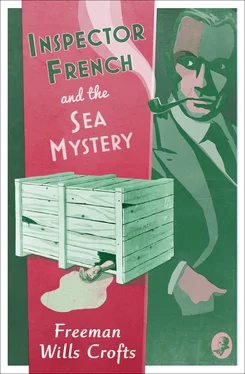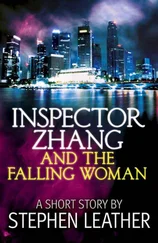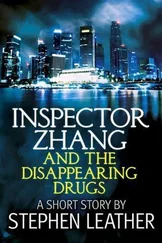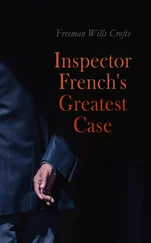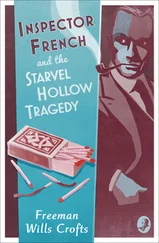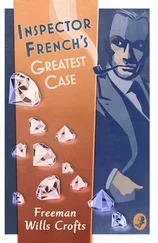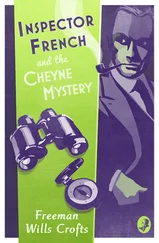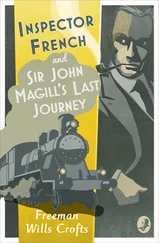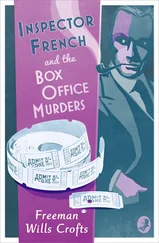The news did not seem very hopeful to French, as over a belated lunch he discussed it with Howells.
‘This opens a second line of inquiry at Ashburton,’ he began, ‘but I do not think somehow that we shall get much from it. I believe the real scent lies here.’
‘Why so? I should have said it depended on what was in the crate when it reached Swansea. And that’s just what we don’t know.’
‘I agree. But to me that sergeant’s report sounds as if things at Ashburton were O.K. If so, it follows that the body was put in some time during that lorry run from Swansea to Loughor. But that doesn’t rule out inquiries at Ashburton. Even if I am right, something may be learned from the order for the machine.’
‘Quite. Both ends will have to be worked. And how do you propose to do it?’
‘Can’t you guess?’ French said blandly. ‘Surely there can be but one answer. I couldn’t hope to do it without the able and distinguished help of Superintendent Howells.’
The other laughed.
‘I thought it was shaping to that. Well, what do you want me to do?’
‘Trace the run, Superintendent. You can do it in a way I couldn’t attempt. I would suggest that with a map we work out the area which could have been visited during that night, allowing time for unpacking the duplicating machine and putting the body in its place. Then I think this area should be combed. If murder has taken place you’ll hear of it.’
‘And you?’
‘I shall go to Ashburton, learn what I can from the order, and if it seems worthwhile, follow it up in London. Then I’ll come back here and join forces with you. Of course we shall have to get Superintendent Griffiths on the job also.’
After some further discussion this programme was agreed to. French, with the superintendent’s help, was to estimate the area to be covered and to organise the search. Tomorrow was Sunday, and if by Monday evening nothing had come of it he was to leave Howells to carry on while he paid his visits to Ashburton and, if necessary, to London.
The longest unknown period of the lorry’s operations being from 8.30 p.m. to 12.30 a.m. at night, this was taken as being the ruling factor in the case. During these four hours the machine had travelled from Neath to Gorseinon, a distance of about twenty-five miles. About two hours would be accounted for by the journey and the changing of the contents of the crate, leaving two more hours for additional running—an hour out and an hour back. This meant a radius of about twenty-five miles. The problem therefore was to make an intensive search of the country within, say, thirty miles of Swansea.
This was a large area, and the work involved the co-operation of a good many men. However, with Superintendent Howells’s help it was arranged and by that evening operations were everywhere in progress.
During the whole of the next two days French remained on the job, working out possible routes for the lorry and making special inquiries along them. But no further information was obtained, and when Monday evening came, without result, he decided that unless he heard something next morning he would start for Ashburton.
But next morning news had come in which made a visit there essential. It appeared that about 9.30 on the evening in question the lorry had been seen standing in the same lane at Gorseinon in which three hours later the police patrol had found it. A labourer reported that he had passed it on his way home. As he approached the driver was sitting on the step, but on seeing him the man had jumped up and busied himself with the engine. The labourer had passed on out of sight, but his way taking him along a path at right angles to the lane, he had looked back across country and noticed the driver again seated on the step and lighting a cigarette. The position of the lorry was the same then as three hours later, and the conclusion that it had not moved during the whole period seemed irresistible.
But if so, it made it much less likely that the body had been put into the crate during the motor drive. The time available would have been so short that the area in which the change could have been made would have been very small indeed. The chances of a disappearance remaining unknown to the police would therefore have been correspondingly reduced. For the first time French began to consider seriously the possibility that the body had come from Devonshire.
While, therefore, Superintendent Howells in no way relaxed his efforts, French took an early train south. He was in a thoughtful mood as they pulled out of the station. This, it was evident, was going to be one of those troublesome cases in which an ingenious criminal had enveloped his evil deeds in a network of false clues and irrelevant circumstances to mislead the unfortunate detective officer to whom an investigation into them might afterwards be assigned. Confound it all! It was not long since he had got rid of that terribly involved affair at Starvel in Yorkshire, and here was another that bade fair to be as bad. However, such was life, and worrying wouldn’t alter it. He was starting on an interesting journey, and he might as well forget his case and make the most of the scenery.
Shortly before six o’clock that evening French stepped out of the train at the little terminus of Ashburton.
He had enjoyed his run, particularly the latter portion through the charming South Devonshire scenery, along the coast under the red cliffs of Dawlish and Teignmouth, and then inland through the well-wooded hills of Newton Abbot and Totnes. He was pleased, too, with the appearance of Ashburton, a town T-shaped in plan and squeezed down into the narrow Valleys between three hills. He admired its old-world air and its pleasant situation as he walked up the street to the Silver Tiger, the hotel to which he had been recommended.
After a leisurely dinner he went out for a stroll, ending up shortly after dark at the police station. Sergeant Daw had gone home, but a constable was despatched for him and presently he turned up.
‘I went to the works at once, sir,’ he explained in answer to French’s question. ‘They’re out at the end of North Street. A big place for so small a town. They employ a hundred or more men, and a lot of women and girls. A great benefit to the town, sir.’
‘And whom did you see?’
‘I saw Mr Fogden, the manager. He turned up the information without delay. The duplicator was ordered from London and he showed me the letter. You can see it if you go up tomorrow. There was nothing out of the way about the transaction. They packed the machine and sent it off, and that was all they could tell me.’
Suspiciously like a wild-goose-chase, thought French, as he chatted pleasantly to the sergeant. Like his confrère at Burry Port, the man seemed more intelligent and better educated than most rural policemen. They discussed the weather and the country for some time, and then French said:
‘By the way, Sergeant, the name of this Vida Works seemed vaguely familiar when you telephoned it. Has it been in the papers lately, or can you explain how I should know it?’
‘No doubt, sir, you read of the sad accident we had here about six weeks ago—a tragedy, if I may put it so. Two of the gentlemen belonging to the works—Mr Berlyn, the junior partner, and Mr Pyke, the travelling representative—lost their lives on the moor. Perhaps you remember it, sir?’
Of course! The affair now came back to French. So far as he could recall the circumstances, the two men had been driving across Dartmoor at night, and while still several miles from home their car had broken down. They had attempted to reach the house of a friend by crossing a bit of the moor, but in the dark they had missed their way, and getting into one of the soft ‘mires,’ had been sucked down and lost.
Читать дальше
